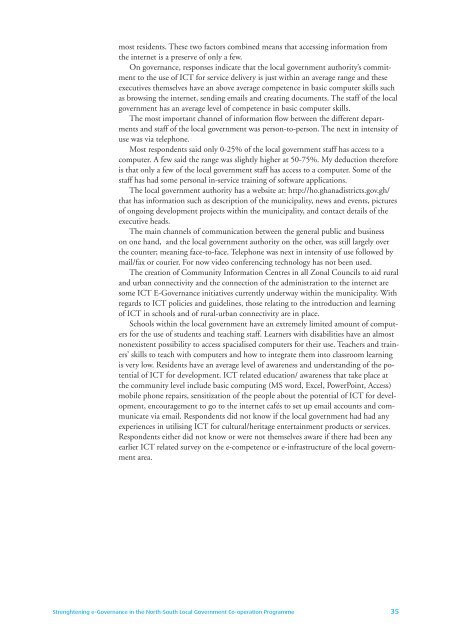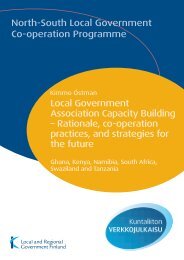E-READINESS QUESTIONNAIRE FOR NORTH ... - Kunnat.net
E-READINESS QUESTIONNAIRE FOR NORTH ... - Kunnat.net
E-READINESS QUESTIONNAIRE FOR NORTH ... - Kunnat.net
Create successful ePaper yourself
Turn your PDF publications into a flip-book with our unique Google optimized e-Paper software.
most residents. These two factors combined means that accessing information from<br />
the inter<strong>net</strong> is a preserve of only a few.<br />
On governance, responses indicate that the local government authority’s commitment<br />
to the use of ICT for service delivery is just within an average range and these<br />
executives themselves have an above average competence in basic computer skills such<br />
as browsing the inter<strong>net</strong>, sending emails and creating documents. The staff of the local<br />
government has an average level of competence in basic computer skills.<br />
The most important channel of information fl ow between the different departments<br />
and staff of the local government was person-to-person. The next in intensity of<br />
use was via telephone.<br />
Most respondents said only 0-25% of the local government staff has access to a<br />
computer. A few said the range was slightly higher at 50-75%. My deduction therefore<br />
is that only a few of the local government staff has access to a computer. Some of the<br />
staff has had some personal in-service training of software applications.<br />
The local government authority has a website at: http://ho.ghanadistricts.gov.gh/<br />
that has information such as description of the municipality, news and events, pictures<br />
of ongoing development projects within the municipality, and contact details of the<br />
executive heads.<br />
The main channels of communication between the general public and business<br />
on one hand, and the local government authority on the other, was still largely over<br />
the counter; meaning face-to-face. Telephone was next in intensity of use followed by<br />
mail/fax or courier. For now video conferencing technology has not been used.<br />
The creation of Community Information Centres in all Zonal Councils to aid rural<br />
and urban connectivity and the connection of the administration to the inter<strong>net</strong> are<br />
some ICT E-Governance initiatives currently underway within the municipality. With<br />
regards to ICT policies and guidelines, those relating to the introduction and learning<br />
of ICT in schools and of rural-urban connectivity are in place.<br />
Schools within the local government have an extremely limited amount of computers<br />
for the use of students and teaching staff. Learners with disabilities have an almost<br />
nonexistent possibility to access spacialised computers for their use. Teachers and trainers’<br />
skills to teach with computers and how to integrate them into classroom learning<br />
is very low. Residents have an average level of awareness and understanding of the potential<br />
of ICT for development. ICT related education/ awareness that take place at<br />
the community level include basic computing (MS word, Excel, PowerPoint, Access)<br />
mobile phone repairs, sensitization of the people about the potential of ICT for development,<br />
encouragement to go to the inter<strong>net</strong> cafés to set up email accounts and communicate<br />
via email. Respondents did not know if the local government had had any<br />
experiences in utilising ICT for cultural/heritage entertainment products or services.<br />
Respondents either did not know or were not themselves aware if there had been any<br />
earlier ICT related survey on the e-competence or e-infrastructure of the local government<br />
area.<br />
Strenghtening e-Governance in the North-South Local Government Co-operation Programme 35




